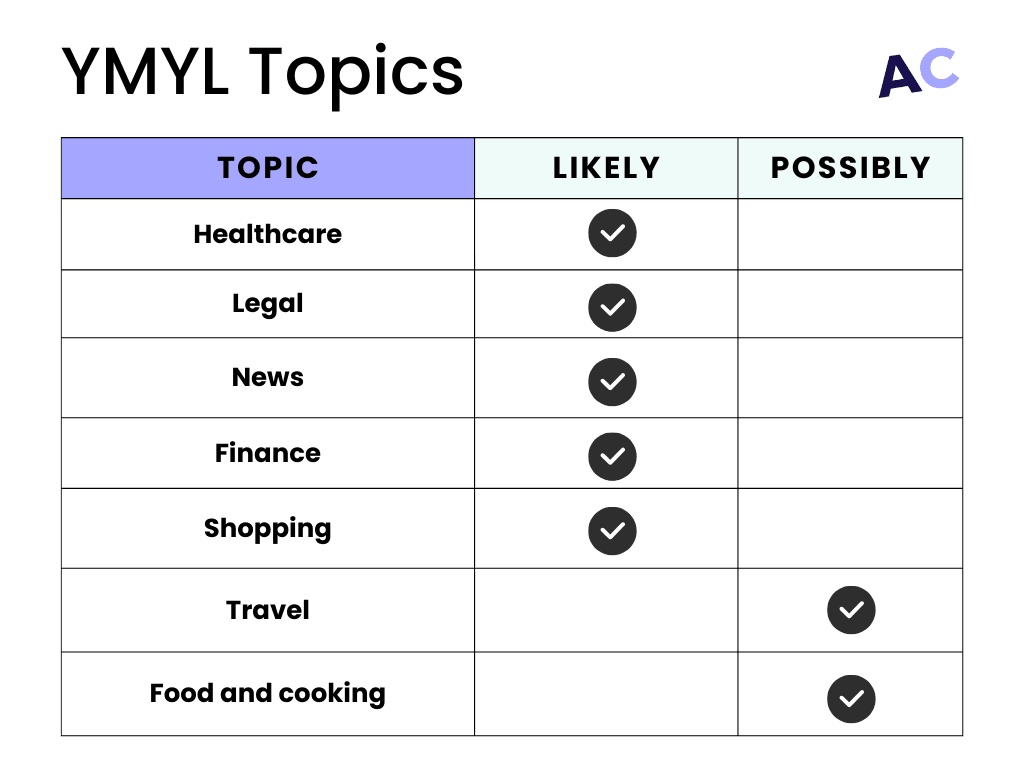YMYL stands for Your Money or Your Life and refers to a category of web pages that can potentially impact a person’s health, financial situation, or safety.
Google uses this term to identify pages that could significantly affect a person’s well-being or decision-making, so it's important to understand the implications for your site.
But why should it matter to you as a website owner or SEO?
In this article, I’ll break down the concept of YMYL, its importance for SEO, and how you can make sure your website aligns with Google’s guidelines to improve your rankings.
What Does YMYL Mean?
The concept of YMYL is part of Google’s broader initiative to deliver the most accurate and trustworthy content in its search results.
Because these types of pages are highly influential in a person’s life, Google holds them to a higher standard, emphasizing experience, expertise, authority, and trustworthiness (E-E-A-T).
The Importance of Understanding YMYL
YMYL pages are subject to stricter scrutiny because of the potential impact they can have on users’ lives.
If a website contains misleading or harmful information in these areas, it can result in serious consequences for the individuals accessing the site.
To provide people with the most accurate and reliable information, Google’s algorithms give extra weight to these pages when determining rankings.
Websites in the YMYL category that lack authoritative content or appear to be untrustworthy can see their rankings suffer as a result.
So, if your website falls under the YMYL category, such as a health, finance, or legal site, you need to be aware of how Google assesses your content and structure.
Types of YMYL Websites
Google has outlined several categories of websites that fall under the YMYL umbrella.
These include:
Health and Safety
Websites that provide health advice, treatment information, mental health support, or anything related to personal health and safety fall into this category.
For example, a website offering advice on how to treat an illness or manage a chronic condition would be considered YMYL.
Why It's YMYL: Misinformation about health can lead to harmful decisions, improper treatment, or worsened conditions. Google prioritizes trustworthy, evidence-based content to protect users' well-being.
Financial Information
Any site providing advice or information on personal finance, investments, loans, taxes, or insurance is classified as YMYL. Examples include financial blogs, banking websites, and credit card comparison sites.
Why It's YMYL: Financial decisions can directly impact an individual's financial stability, savings, or investments. Incorrect or misleading information can result in significant monetary loss.
Legal Information
Websites offering legal advice, such as those guiding personal injury claims or estate planning, are considered YMYL. These pages can significantly affect someone's legal rights or decisions.
Why It's YMYL: Legal content can influence critical decisions regarding rights, obligations, and legal proceedings. Inaccurate advice may lead to legal issues or missed opportunities for legal protection.
News and Public Information
Websites that provide news related to significant events, politics, or world affairs, or influence public opinion, also fall under YMYL. Accurate and reliable news sources are critical in this category.
Why It's YMYL: News impacts how individuals perceive the world, vote, and make decisions affecting public safety and well-being. Misleading or false information can cause panic or societal harm.

How Google Evaluates YMYL Pages
Google evaluates YMYL pages using its E-E-A-T framework (Experience, Expertise, Authoritativeness, and Trustworthiness). Here's a breakdown of what each of these means in the context of YMYL:
Experience
Experience refers to the firsthand knowledge or practical involvement an author has with the topic.
Content created by individuals with genuine, real-world experience provides more reliable and accurate information.
For example, a nutritionist writing about diet plans is more trustworthy than someone with no professional or personal background in nutrition.
Expertise
People with credentials or experience in the subject matter should create content.
For example, medical advice should come from licensed professionals, and financial guidance should be written by certified experts.
Authoritativeness
Websites should establish themselves as reputable sources within their specific industry.
Having backlinks from authoritative sites in the same field can enhance your website’s authoritativeness.
Trustworthiness
Websites should be transparent about their content and the people behind it.
For YMYL websites, this means clear contact information, secure transactions, and clear disclaimers regarding the advice being given.
How to Improve E-E-A-T for Your YMYL Website
If your website falls into the YMYL category, here are some actionable tips to improve your SEO and ensure that Google views your site as reliable and trustworthy:
Build Your Reputation with Quality Content
Create well-researched, in-depth content that addresses users’ needs.
Cite authoritative sources and ensure that the information is current, accurate, and helpful.
How to do this
Include expert opinions and cite reputable research.
Make sure the topic is covered holistically.
Add actionable and relevant insights.
Get Expert Contributors
Have experts contribute to your content or consult them regularly.
If you're not an expert yourself, work with professionals who are recognized in their field.
How to do this
Add author sections and bios to add information about the writer's past projects, education, and relevant experience.
Use tools like Qwoted to source expert insights.
Provide Clear Company Information
Provide contact information on a clear and easily accessible "About" page to show transparency.
This builds trust and lets users know who is behind the content they’re consuming.
Regularly Update Content
Outdated information, especially in fields like health and finance, can be harmful.
Make it a priority to update your content regularly to reflect the latest data, research, and best practices.
How to do this
Create a process to identify content that was published over 6 months ago.
Engage with Your Users and Readers
Encourage reviews, comments, and feedback to establish a community around your site.
Positive testimonials and interactions can support your trustworthiness.
How to do this
Add reviews to your pages where it's relevant.
Create a separate reviews and testimonials page.
Create an Editorial Standards Page
If you have a content process that values E-E-A-T, why not publish it publicly?
How to Do This
Create a page on your website that outlines your editorial standards. You might include:
Where you get your information from
Who your writers are
An outline of any review processes you have (like medical review)
The type of sources you prioritize
Who you quote
Final Thoughts
Understanding YMYL will help you provide accurate, reliable information to your readers while satisfying Google's search standards.
By implementing the principles of YMYL and focusing on experience, expertise, authority, and trustworthiness, you’ll be better equipped to maintain high visibility on Google and foster long-term success for your website.


